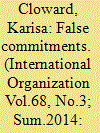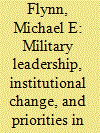|
|
|
Sort Order |
|
|
|
Items / Page
|
|
|
|
|
|
|
| Srl | Item |
| 1 |
ID:
133272


|
|
|
|
|
| Publication |
2014.
|
| Summary/Abstract |
A substantial international relations literature addresses the various ways in which international actors, and the norms they promote, influence state behavior. But less attention has been paid to the influence these actors directly exert at the local level, despite the fact that many transnational campaigns promote norms for which individuals-not states-are the primary transgressors. If individuals behave as some states do, publicly embracing international norms only because they expect a financial or reputational benefit from doing so, then the campaigns have not fully succeeded. But when do individuals engage in real behavior change, and when do they simply change the public image they present to the international community? To begin to address this question, I employ a randomized field experiment to evaluate individuals' willingness to make claims that differ from their true normative commitments. I conducted the experiment in the context of an original 2008 opinion survey about female genital mutilation and early marriage, run in rural Kenya. I find that respondents misrepresent their behavior and intentions, and I supplement these findings with an exploration of causal mechanisms through qualitative interviews.
|
|
|
|
|
|
|
|
|
|
|
|
|
|
|
|
| 2 |
ID:
131058


|
|
|
|
|
| Publication |
2014.
|
| Summary/Abstract |
How does political competition among domestic actors influence foreign policy choice? Studies examining these questions often focus on the role of economic or partisan interests, and how they influence the preferences of decision makers who are subject to electoral institutions and pressures of their constituents. Less attention has been paid to how the preferences of other influential but unelected actors influence state behavior. I examine the influence of one such group by looking at how American military leaders shape decisions on military spending and force structure, while also examining how these decisions have been affected by changes to the institutions governing civil-military relations. Results indicate that military leaders occupying key positions can influence defense spending priorities in favor of their respective branches. Results also suggest the influence of military leaders has changed and is conditional upon the institutions governing the relationships between civilian decision makers and military leaders
|
|
|
|
|
|
|
|
|
|
|
|
|
|
|
|
| 3 |
ID:
090146


|
|
|
|
|
| Publication |
2009.
|
| Summary/Abstract |
Kenneth Waltz opted to reject the rational actor assumption in developing his theory of international politics. That choice, I argue in this article, creates three problems for his theory. First, it means that it is unsuited for explaining state behavior, which means it is of limited utility for explaining the workings of the international system. Second, Waltz's claim that his theory is well suited to explaining international outcomes - as opposed to state behavior - is unconvincing. Those outcomes are heavily influenced by the actions of the great powers, but if his theory cannot predict their behavior, it is unlikely to reliably predict the outcomes of their behavior. Third, Waltz's assumption that states often behave recklessly leads to a more competitive world than described in his theory. I conclude with the suggestion that the theory's greatest virtue is its normative value - its ability to explain how the world should work, not how it works.
|
|
|
|
|
|
|
|
|
|
|
|
|
|
|
|
| 4 |
ID:
151229


|
|
|
|
|
| Summary/Abstract |
Reforming the United Nations Security Council has been on the agenda of the General Assembly for over two decades. However, structural reform of the Council remains elusive. This article explains why after so many years nearly all 193 states within the UN remain actively seized on the matter of reform, despite no immediate outcome being in sight. In order to analyze Security Council reform efforts and the various obstacles along the way, this article emphasizes states’ motivations during the reform process. With the help of new institutionalist theory, an argument is formed that highlights how certain states are driven by strategic calculations and self-interest, while others are more normatively motivated. Furthermore, the article highlights that despite only lukewarm support for reform from certain states, not a single state can publicly denounce Council reform, because the reform issue itself has become an ingrained norm.
|
|
|
|
|
|
|
|
|
|
|
|
|
|
|
|
| 5 |
ID:
085924


|
|
|
|
|
| Publication |
2009.
|
| Summary/Abstract |
American primacy in the global disrtribution of capabilities is one of the most salient features of the contemporary international system.The end of the cold war did not return the world to multipolarity.Instead the United States-already materially preeminent-became more so.
|
|
|
|
|
|
|
|
|
|
|
|
|
|
|
|
|
|
|
|
|